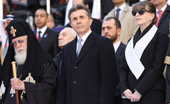New President, New Constitution, New Era
By Ana Robakidze
Monday, November 18



“I, the President of Georgia, before God and the nation, declare to observe the Constitution of Georgia, defend the independence, unity and indivisibility of the country, to perform faithfully the duties of the president, to oversee the security and welfare of the citizens of my country and for the revival and might of my nation and homeland,” Margvelashvili said, placing his hand on the Constitution.
After the ceremony, Prime Minister Bidzina Ivanishvili stated that “a new era” was beginning in the country and it was an end to an authoritarian regime.
“We have a truly European president and Georgia will have a truly democratic government.” Ivanishvili stated.
53 delegations of foreign countries and 220 guests arrived in Tbilisi to attend president’s inauguration on November 17th. Governments which were not able to send their representatives in Tbilisi, sent their ambassadors to the ceremony. Former Presidents of Georgia, Mikheil Saakashvili and Eduard Shevardnadze were absent from the ceremony. Shevardnadze, who is in his eighties, could not attend the inauguration due to health issues.
Saakashvili's administration stated earlier that the president would be presented at the ceremony, depending on the new government’s attitude to the institution. Saakashvili said earlier in November that that the government’s decision not to use the Avlabari presidential palace as the residence of the new president was disrespectful to state institutions. In his official statement released on November 17th, the outgoing president thanked employees of his administration and state security special service for honestly fulfilling their duties. Saakashvili released another statement and said he would not attend the inauguration ceremony and he preferred to abstain from participation in political affairs.
President of Lithuania, Dalia Grybauskaite, was the highest-ranking foreign dignitary to attend the inauguration ceremony. Other foreign dignitaries who arrived in Tbilisi were the PM of Azerbaijan, the foreign ministers of Romania, Kyrgyzstan, and Armenia, the deputy foreign ministers of Iran, Moldova, Bulgaria, Estonia; the State Secretary for European affairs of Portugal; president of upper house of the Austrian parliament; vice-speaker of lower house of the Polish parliament; Ukraine’s deputy PM; parliamentary vice-minister for foreign affairs of Japan; minister of culture of Qatar; vice-speaker of parliament of Belarus; minister of labor and social security of Turkey; minister of economy of Turkmenistan; deputy PM of Kazakhstan; NATO Secretary General’s special representative for the Caucasus and Central Asia. The U.S. delegation was lead by Rajiv Shah, administrator of the U.S. Agency for International Development (USAID).
U.S. President Barack Obama released an official statement on November 16th and congratulated Georgia on electing a new president and strengthening democracy in the country.
“On behalf of the American people, I congratulate the people of Georgia as they celebrate the inauguration of the new president and mark the first time a presidential transition has taken place as the result of a peaceful, democratic election.” Obama stated.
After being sworn-in as the new president, Margvelashvili delivered his inauguration speech.
As soon as the oath-taking ceremony was over, a new constitution entered into force, shifting the system of government from a presidential to a mixed system. The amended version of the Constitution significantly increases the prime minister's powers, while cutting the president's. The president is still the head of state, represents the country in foreign relations and he remains as the commander-in-chief. He can negotiate with foreign governments and sign international treaties. However, the president loses the power to lead and exercise domestic and foreign policy. Also, he will need the PM's authorization on number of legal acts. The president will hold one very important right-the right to veto prime ministerial nomination by the Parliament.
After the inauguration, President Margvelashvili laid a wreath at the Memorial of Heroes and, hosted a lunch for the foreign guests at the Courtyard Marriott hotel. Later in the day, a concert was held for the guests at Rustaveli theatre.
